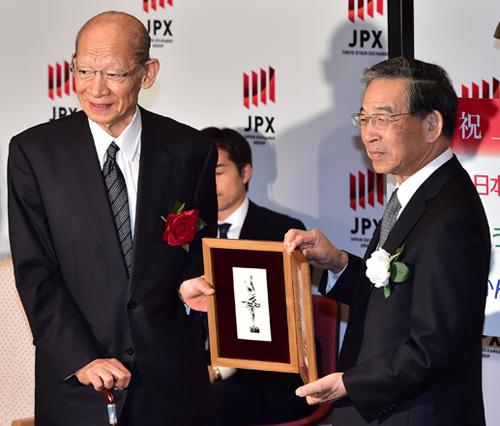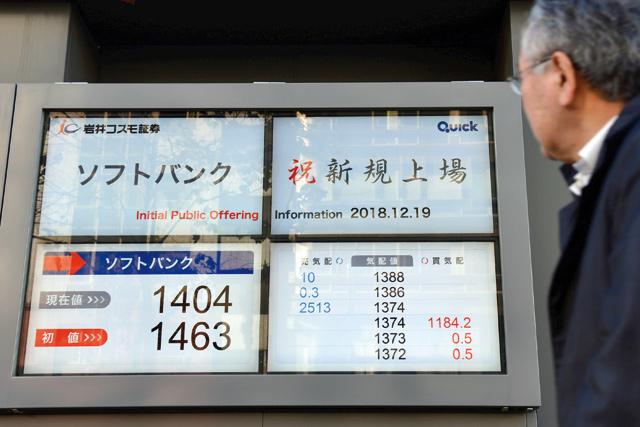You are here
Japan Post soars in Tokyo trading debut after $11.5b IPO
By AFP - Nov 04,2015 - Last updated at Nov 05,2015

Japan Post Holdings President Taizo Nishimuro (left) receives a certification from Akira Kiyota (right), CEO of the Tokyo Stock Exchange, during the ceremony for the company’s listing at the first sector of the Tokyo Stock Exchange on Wednesday (AFP phot)
TOKYO — Japan Post skyrocketed on its trading debut Wednesday after the biggest initial public offering (IPO) this year, lifting hopes that privatising what is effectively the world’s largest bank will boost Tokyo’s faltering growth blitz.
Shares in the vast company, along with its banking and insurance units, were listed on the Tokyo Stock Exchange following an $11.5 billion share sale, in the largest offering globally since Chinese e-commerce giant Alibaba’s record $25 billion IPO last year.
The bulk of proceeds from selling shares in the government-owned behemoth, which has about 24,000 offices nationwide, are earmarked for reconstruction efforts after Japan’s 2011 quake-tsunami disaster.
Japan Post holds 200 trillion yen ($1.65 trillion) in deposits from millions of Japanese households, the equivalent of 40 per cent of the country’s gross domestic product (GDP).
Tokyo is expected to sell off more of the company to help pay for spiralling social-welfare costs in Japan’s biggest privatisation since Nippon Telephone & Telegraph’s 1987 IPO.
The triple-listing brings with it hopes of drawing more investment to Japanese firms and a lift for Prime Minister Shinzo Abe’s faltering bid to kickstart the world’s number-three economy, known as “Abenomics”.
Analysts said shareholder pressure would help force Japan Post to speed up its decision-making and control costs.
It could also send a wider message that Japan Inc.’s notoriously rigid corporate culture is being shaken up.
“We have shareholders now and so we’re going to promise to lift the value of Japan Post group,” the company’s President Taizo Nishimuro told reporters at the stock exchange. “I believe this will contribute to boosting the Japanese economy.”
Legislation passed under the government of former prime minister Junichiro Koizumi stipulated that the company be split into four units in 2007, to handle deliveries, savings, insurance and counter services at each of its post offices.
Heizo Takenaka, who was a key member of Koizumi’s government and a main driver of Japan Post’s privatisation, said the IPO was not an end in itself.
“What is important is to instill a private management culture,” he stressed. “We are now at the start of that process.”
Nationwide network
At the close, Japan Post Holdings soared 25.7 per cent to 1,760 yen ($15.50), well up from its 1,400 yen IPO price, while the banking unit’s stock jumped 15.2 per cent from its offering price to 1,671 yen.
But the hotly anticipated insurance unit’s debut was the star of the day, skyrocketing 55.9 per cent to 3,430 yen.
The share sale was a hit at home with many ordinary investors eager to get their hands on Japan Post shares, with the effort getting a boost from plenty of Internet and television coverage.
A pensioner who bought shares in the bank and insurance units, said he was “happy to see the initial prices are high but I’m not sure in the longer term. I just hope to get dividends”.
Some observers warned that Japan Post must overhaul its lumbering style to fully succeed.
“One of the company’s greatest advantages is its nationwide network. The downside is its lack of cost-consciousness,” Yasuhide Yajima, chief economist of NLI Research Institute, indicated. “The biggest risk though is that the company lacks a sense of speed.”
Questions over competitiveness
The postal giant’s efficient mail delivery unit, a big source of national pride in Japan, will remain untouched largely due to social and political pressure to maintain the status quo, including the presence of post offices across the archipelagic country even in its most remote villages.
These offices also offer services for cash deposits and insurance, and a local branch where many of Japan’s legions of retirees withdraw their pension payments.
That system, however, has long drawn criticism both inside and outside Japan.
Financial institutions, carrier services and foreign governments argued that the public body was operating in sectors where it competed directly with private businesses.
In February, Japan Post announced its first overseas acquisition with the $5 billion takeover of Australia transport logistics giant Toll Holdings.
Yoshiaki Miyakoshi, 76, a former trading house official checking share prices on a flashing board outside a brokerage in central Tokyo, told AFP that the listing “will perhaps have some positive impact on the Japanese economy”.
Related Articles
TOKYO — Japan’s Fujitsu said on Thursday it had agreed to merge its struggling PC business with Lenovo, giving the Chinese computer giant a
TOKYO — Japanese car giant Toyota upgraded its full-year forecast on Tuesday, as the firm posted a 16-per cent gain in net profit for the si



















